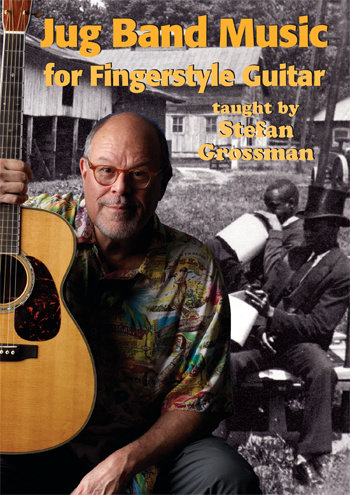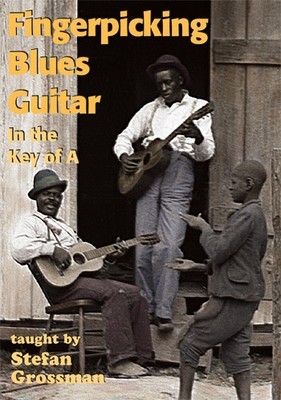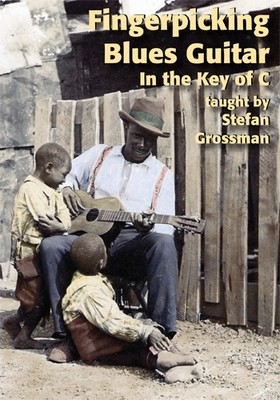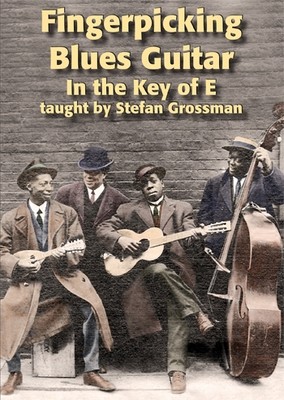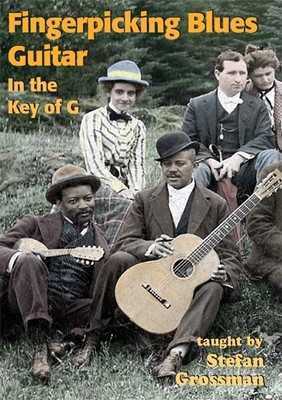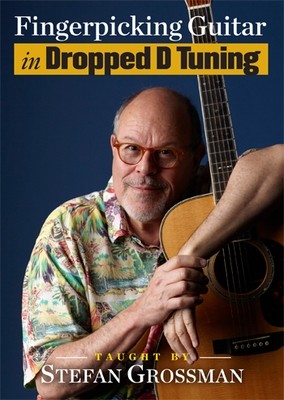
Jug Band Music for Fingerstyle Guitar - taught by Stefan Grossman
The good timey sounds of jug band music - infectious and influential - have enjoyed popularity since its beginnings in the "spasm" and "novelty" bands that developed in New Orleans in the late 19th and early 20th Century. Jug bands were playing jazz and blues long before the music was recognized and labelled as such. Their instruments were home made in some cases, or substitutions were found such as with a jug sounding like a tuba, or using a washboard for a rhythm instrument. Music was made and created and invented, and new styles were developed. Jug bands played on all the Ohio and Mississippi riverboat paddle wheelers and many of the southern night clubs. They were in vaudeville, on the streets and in traveling medicine shows.
Two of the most popular and well recorded jug bands in the 1920s were Cannon's Jug Stompers and The Memphis Jug Band. In this lesson I have arranged some of their songs for fingerstyle guitar. I have also included the wonderful Shine On Harvest Moon which fits perfectly in to the jug band tradition. They're fun songs to play and sing. You'll probably recognize some of the titles and melodies from the recordings of the Rooftop Singers, Grateful Dead and Lovin' Spoonful.
Jug band music is close to my heart. In 1964 with my friends Steve Katz, John Sebastian, Maria Muldaur, Josh Rifkin, Peter Siegel and Bob Gurland we formed the Even Dozen Jug Band. Hopefully some of the fun and joy that I found in jug band music has been transposed to the fingerstyle arrangements in this lesson.
A detailed tab/music booklet is included as a PDF file on the DVD. Each tune is taught phrase by phrase and played slowly on a split-screen. As well, a Bonus Audio section features original recordings of the tunes taught.
Titles include: Stealin' Stealin', Going To Germany, K.C. Moan, Mississippi River Waltz, Walk Right In and Shine On Harvest Moon
117 minutes - Level 2/3 - Detailed tab/music PDF file on the DVD
Review: With just a little application and practice it's actually possible to start sounding like one of our editor's all-time favourites, kids! The Jug Band repertoire of the 1920s and 1930s is a rich vein for the solo performer to mine. Stefan Grossman was (with, among others, John Sebastian and Maria Muldaur) a founding member of the legendary Even Dozen Jug Band. The deep, abiding love that he has for this music is obvious. Using ideas and techniques learned first-hand from Rev Gary Davis, Grossman guides the viewer through his solo arrangements of Stealin', Going To Germany, KC Moan, Mississippi River Waltz, Walk Right In and Shine On Harvest Moon. The DVD's running time is 117 minutes, the fun lasts a lifetime. This lesson is best suited to more experienced players. The disc features the usual Guitar Workshop high-standard split-screen camera angles, and includes a PDF booklet of the tablature and notation, plus bonus audio sections with all the original recordings.– Steve Hunt/fRoots
Review: As a guy who tried to be "Johnny Jug Band Seed" in various ways for a couple decades I always welcome any other efforts in that direction. Stefan Grossman was in the Even Dozen Jug Band with Maria Muldaur, John Sebastian and several other players back in the early 1960s, and now he's got this new teaching DVD for some popular Jug Band songs. We've gone over the style of these videos several times: spilt screen - two cameras so you can see both hands; after playing through the tune each part is carefully explained and then played again slowly; a pdf file with tablature for all the parts taught; and in this and many cases the original recordings of the songs also included as a bonus on the disc. The list of tunes taught seems shorter than usual, but the disc has 117 minutes of playing time. Taught are "Stealin' Stealin'" , "Going To Germany" (actually, there is a town in Mississippi called Germantown, and around here we sing "Goin' to Duvall", "K.C. Moan," "Mississippi River Waltz,"; "Walk Right In," and "Shine On Harvest Moon." These tunes are in at least 3 different keys, so you get a wide variety of licks you might also be able to use in your own songs! Another bonus feature is a 1950s video of original Memphis Jug Band members Will Shade (playing resonator tenor guitar) and Charlie Burse (washtub bass) singing "Kansas City Blues." Although I believe I've reviewed another Guitar Workshop DVD that had this same clip, it is absolutely precious, and if you've never seen it would be worth the price of admission by itself. Having met a couple of the original Even Dozen Jug Band, I've really enjoyed getting to know Stefan a bit through his videos and other recordings over the years! Now if I could only locate my cassette that has "Jug Band Songs Of The Southern Mountains" by the Even Dozen Jug Band! I've got the case, but the cassette has gotten misfiled. – Marc Bristol/Blue Suede News
Review: Unlike the hard, rotgut stuff, jug band music is the champagne of the blues world: typically effervescent, festive and fun - making it all the more intoxicating. During the formative period of the 1920s and 1930s is when kingpins like Will Shade's Memphis Jug Band and Gus Cannon's Jug Stompers began uncorking the genre. Then the blues revival of the 1960s sparked a popular resurgence of both the songs and the band format. "Stealin' Stealin'" re-lived as a staple of primordial Grateful Dead sets, circa 1966. The Rooftop Singers renovated "Walk Right In" for their one-hit-wonder smash of 1963. That's also when the Even Dozen Jug Band sprung forth. Having been a member (along with David Grisman, John Sebastian and Maria Muldaur), Stefan Grossman knows the inside scoop about the bubbly business, sharing two hours of his firsthand insight by arranging Jug Band Music for Fingerstyle Guitar. Here, you'll conquer the "unfriendly" Rev. Gary Davis/Merle Travis C7 chord; the fanciness of diminished chords; the string-pinched loveliness of "Mississippi River Waltz," as well as five other singalong stomps. "K.C. Moan," a chugging railroad piece, receives the Lonnie Johnson treatment, right down to extracting honey from its D chords. "Shine on Harvest Moon" uses the same rustic recipe as when Texas bluesman Mance Lipscomb cooked it, unjugged. Historic audio recordings dating as far back as 1909, along with 1950s footage of Will Shade and Charlie Burse in ragged-but-right action, are among the DVD's hidden surprises. – Dennis Rozanski/Blues Rag
